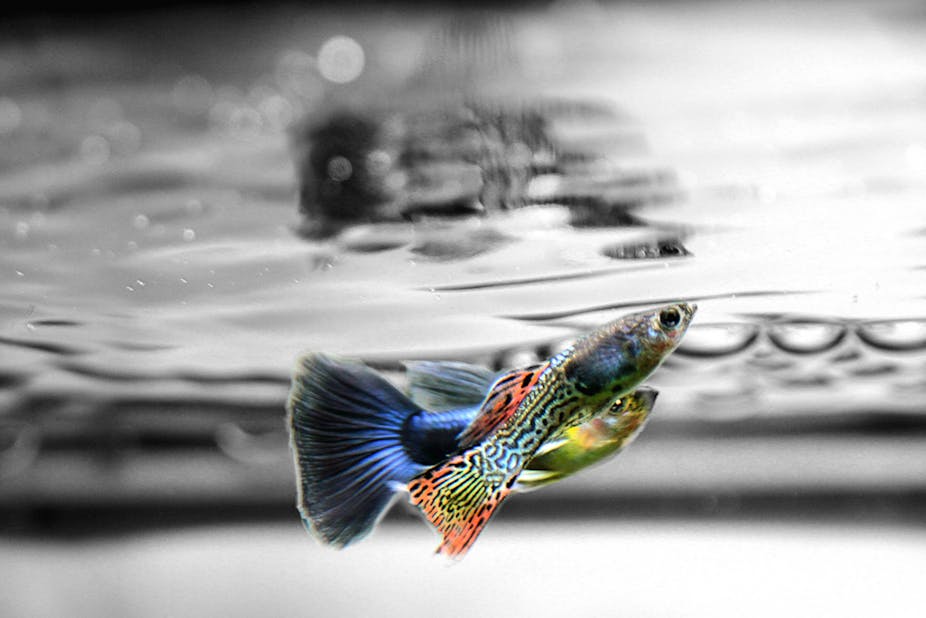When it comes to sex among guppies, competition is high for those at the top of the game. To get around this predicament, a recent study has shown, guppies use trickery.
Competition in fish of the Poeciliidae family (fresh-water fish to which guppies belong) is especially intense, because members of the species commonly mimic each others’ choices. This creates a conundrum: what to do when everyone wants the same mate?
Poeciliids also experience significant sperm competition. After copulation, females can store sperm to use later, meaning that sperm from multiple males co-exist and compete within the female’s body.
There is evidence that more recently injected sperm is more likely to be used to fertilise eggs. Thus, a male poeciliid has a very good reason to lead other males away from his preferred female. If he can prevent — or even delay — her copulation with another male, then he can improve his odds of fathering her offspring.
Poeciliids are known to mimic each other’s mate choices, which means that by the very act of copulating with his first-choice mate, a male may have encouraged his rivals to do the same. It is a poeciliid predicament.
One way to get around this is to fake it. If you are vigilant about when others are observing and imitating your choices, then you can act as though you prefer X, even when you actually prefer Y. This will make others eager to obtain X as well, leaving you with Y all to your manipulative self.
If a male fish were especially successful at this form of trickery, he could mate with his preferred female first, then turn around and mate with a different, less desirable one, to try to divert the attention of rival males away from his first choice. A little bit of deception could go a long way when it comes to avoiding sperm competition.
David Bierbach and colleagues at the University of Frankfurt designed a study to test this hypothesis. They conducted experiments to determine whether the more sexually active species - the ones most likely to have mating systems involving sperm competition — were more likely to change their mate preference when they had an “audience” of another sexually mature male. They obtained data from ten types of poeciliid fish.
The researchers determined whether male sexual activity and aggression was consistent within species, and also whether behaviour differed between species. Next, they tested to see whether more sexually active species were more aggressive than less sexually active species. Finally, they compared the magnitude of “audience-induced” changes in mate choice across species.
Then, the ultimate question: if there are differences in deceptive mate choice between species, are the more deceptive species also the more sexually active and aggressive species, as hypothesised?
To understand the answer to that question, we need to step back. Deceptive mate-choice behaviour may not be entirely explained by sperm competition. It could be that a male is trying to avoid an aggressive encounter with another male by selecting non-preferred females when rivals are around. He may be more of a wimp than a trickster. This is why Bierbach also tested whether a species’ level of male aggression was correlated to sexual activity and audience effects in mate choice.
Bierbach’s results are best summarised in the title of the journal article: “Casanovas are liars”. The results indicate that male poeciliids are indeed tricksters: males showed significant “audience effects” in nine of the ten species that were tested. There was a positive correlation between level of sexual activity and the likelihood that a male fish would show audience effects in his mate choices. However, the analyses show correlation, not causation. Every reason to keep studying guppy sex.

